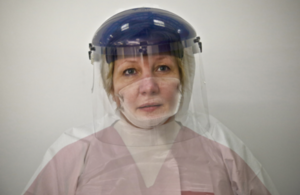Over 70 NHS heroes fighting Ebola this Christmas
British medics are being thanked for their work to defeat the disease in Sierra Leone.

Composite photo of Nurse Donna Wood beneath her protective equipment. Picture: Simon Davis/DFID
The government extends a special thanks to the doctors, nurses and health specialists from across the UK who will spend Christmas Day in Sierra Leone helping to treat Ebola patients, Development Secretary Justine Greening said today (22 December 2014).
More than 70 NHS volunteers have travelled directly to the West African country to work in British-built treatment centres, while many more are working with local hospitals and community centres on the ground, supported by UK aid.
Video: British medics on the frontline of Ebola
Doctor Stacey Mearn’s - On the frontline of Ebola
Their efforts are part of the £230 million UK package to contain, control and finally defeat the disease in Sierra Leone.
Nurse Donna Wood joined the first wave of NHS volunteers to work directly in the British-built treatment centres.
Since arriving in Freetown on 7 December, Wood has undergone training in the hot, oppressive Personal Protective Equipment (PPE) suits that form the only barrier between the health workers and the disease.
With temperatures in Sierra Leone regularly topping 30°C, someone who spends just one hour in the PPE suit can lose over a litre of water due to the heat.
Meet the medics behind the mask - view feature

Image - a graphic from the Medics Behind The Mask interactive
Since completing the training she has been treating patients in an Ebola treatment centre in Kerry Town, just outside the capital Freetown. The British-built and British-funded centre, which opened last month, is being run by Save the Children.
Nurse Wood said:
Working on the Ebola response has and continues to be a huge challenge. It is often physically and emotionally draining. However on the occasions that you witness patients recover and be discharged home to their grateful families it makes it totally worthwhile.
From the day I arrived in country almost 4 weeks ago I have been amazed by the positive atmosphere here. The local people have been so friendly and welcoming and are truly grateful to us for being here.
Being away from my family this Christmas is just a small sacrifice that the people here in Sierra Leone are worthy of.
Doctor Stacey Mearns has been volunteering with the King’s Health Partners on the isolation ward at Connaught Hospital, Freetown since October – backed by British aid.
She was determined to help however she could and understands the commitment of her colleagues through the Christmas period.
Dr Mearns said:
I have a real love for Sierra Leone and felt devastated by what was happening here.
There is nowhere else I would rather be in the world right now. I just wanted to be here, doing whatever I can to contribute to the response
International Development Secretary Justine Greening said:
While many of us wind down over Christmas, hundreds of Brits will be carrying on the fight against Ebola in Sierra Leone. The disease continues to claim the lives of men, women and children every day.
These NHS heroes, like Donna, spending Christmas on the Ebola treatment wards are an absolutely essential part of our efforts to contain, control and defeat this terrible disease. I’m sure I speak for the British public in offering them our thanks for the vital work they are doing this Christmas.
There have now been over 8,000 reported cases of Ebola in Sierra Leone. Nearly 2,500 people have succumbed to the disease.
The deployment of NHS volunteers is one part of the UK’s £230 million response to the Ebola response in Sierra Leone. This response includes:
- supporting more than 700 treatment beds to help up to 8,800 patients over 6 months
- shoring up the country’s stretched public health services to help contain the disease. This includes vital supplies such as chlorine and protective clothing for thousands of health workers
- training over 4,000 healthcare workers, logisticians and hygienists including Sierra Leonean Army and Prison staff, led by UK military personnel who ran the UK-led Ebola Training Academy in Freetown
- opening up to 200 Community Care Centres where people who suspect they might be suffering from the disease can seek swift and accurate diagnosis and appropriate care
- building, running and staffing three new labs in Sierra Leone to help check the spread of the deadly Ebola virus and double the number of tests that can be carried out every day
- supporting charities on the ground to work with people to agree practices which will allow them to honour their friends and relatives, while ensuring bodies are safely buried
- doubling the number of burial teams in Freetown – and providing over a hundred across the country. With UK support IFRC burial teams in Sierra Leone’s western area, which accounts for approximately a third of the country’s population, are now burying 100% of reported bodies within 24 hours.
General media queries (24 hours)
Email mediateam@dfid.gov.uk
Telephone 020 7023 0600
If you have an urgent media query, please email the DFID Media Team on mediateam@dfid.gov.uk in the first instance and we will respond as soon as possible.